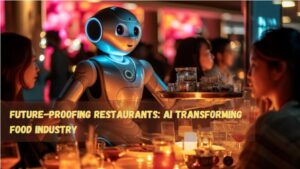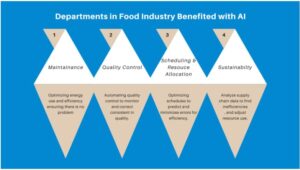
Source: Canva
Have you ever been to a restaurant where a robot provides food? It may seem like an idea from a science fiction movie, but it’s becoming real in the food industry. As people’s needs change and competition grows, staying ahead needs more than just good food and nice service. Imagine a world where your restaurant can guess what customers want before they order, waste nearly no food, and run smoothly all the time. This is the biggest change AI brings to the food industry.
AI is changing the game for restaurants, kitchen efficiency, marketing, and staff training. Whether you own a restaurant and want to make more money or you love cooking and want to give customers a better experience, using AI is the future of the food industry. Let’s look at how AI can prepare your restaurant for the future and give you an advantage in a world that is changing rapidly.
Revolution of AI in Restaurant Operations
Modern businesses depend on streamlining supply chain management and improving the customer experience. Predictive analytics play an essential role in supply chain management for forecasting and allowing organizations to anticipate customer’s needs and optimize the amount of stock available. Automation in inventory management increases efficiency by reducing mistakes and assuring timely restocking. Furthermore, AI-driven insights support stronger supplier relationships, better cooperation, and enhanced supply chain resilience.
On the consumer experience, AI creates personalized dining experiences by evaluating client data and personalizing meals according to specific preferences. AI-powered chatbots help customer service by resolving bookings and inquiries quickly and accurately, enabling seamless interactions.
Statista forecasts that the worldwide food automation and robotics market will expand by around 5.4 billion units by 2030. This demonstrates that the seamless integration of AI and robots will influence the future of the food industry, with the potential to stimulate innovation, efficiency, and sustainability.

Source: Statista
AI-Driven Marketing and Sales
Using AI to help with selling and getting more people to restaurants makes big changes in the food business. Using facts about what food people prefer more through sales and feedback would provide accurate data on the quantity of cooking. Analyzing the data about the customer’s preferences helps to hold on to them and get them to buy more. Using the sales data to look at what people do on the web helps sell more and give them what they want when they want it. The specialized AI data of the sales can change the cost of food based on whether lots of people want it or just a few. These implementations not only impact the customer but also the administration, servers, and chefs who can modify their process of serving food and providing service which greatly enhances customer satisfaction. Explore slang.ai to assist calls in restaurants. This powerful AI transforms the service with the expected satisfaction and right service to the customers.
Food Processing Benefits with AI

Source: Canva
In the realm of the Food Processing Industry, AI brings essential benefits to bring great impact. Some of the key aspects are:
- Maintenance:
AI enables predictive maintenance by employing a machine learning algorithm to detect problems with the equipment before they occur. This approach reduces downtime and ensures continuous production.
- Quality Control:
AI employs machine learning algorithms to automate quality inspections. It examines multiple sources of data to ensure consistent product quality, finding inconsistencies and allowing for early corrections.
- Scheduling and Resource Allocation:
Artificial intelligence enhances manufacturing procedures by estimating demand trends and simplifying resource allocation. Automation minimizes manual labor, increases production cycles, and improves operational efficiency.
- Sustainability:
AI helps advance efficiency by optimizing waste-reduction processes such as inventory management and energy consumption. It helps to reduce environmental impact and improves efficient resource consumption in food processing processes.
Employee Efficiency and Training
In the dynamic environment of restaurants, employee efficiency, and training are essential to deliver perfect dining experiences. Artificial Intelligence categorizes the schedules and tasks of restaurant staff who are trained and managed to ensure that their team performs at their best. AI-created training programs and resources will provide betterment in learning experiences based on individual strengths and weaknesses, helping in employee development. Virtual reality simulations powered by AI will demonstrate employees in realistic scenarios, from customer interactions to kitchen operations enhancing their skills and confidence.
Further, AI optimizes workforce management by analyzing the received data to create efficient schedules that align with schedule timings and staffing requirements. This not only boosts productivity but also reduces labor costs. Continuous feedback provided by AI systems will enable managers to track performance metrics in real time, identifying areas for improvement and celebrating successes. By implementing AI for employee efficiency and training, restaurants empower their teams to deliver superior service, adapt to evolving industry demands, and ultimately, contribute to the restaurant’s overall success and growth.
Future Trends and Innovations
Looking into the future, the next generation of restaurants is at the intersection of AI and innovation, featuring new developments that will change hotel experiences. AI’s contribution to enhancing food service infrastructure will help to minimize wait time, leading to quicker and more effective services. Augmented reality improves visualizing the food experiences which will provide customers with realistic interactions with menus and ambiance, increasing engagement and satisfaction. Furthermore, using blockchain in supply chain management would ensure transparency and traceability, ensuring customer food safety and quality. Sustainable methods will become more widespread, with AI campaigns to reduce waste and increase energy efficiency. Restaurants that employ these technologies not only prepare for the future but also adapt to changing customer needs for convenience and sustainability.
Ethical Considerations and Regulatory Challenges
Every implementation has its ups and downs when navigating ethical considerations and challenges it is necessary to maintain trust and compliance. Some aspects of the considerations are,
- Data Privacy and Security
The Customer data is ensured that it is handled responsibly by implementing robust cybersecurity measures to protect against data breaches, safeguarding sensitive data from unauthorized access. Transparent practices in data collection, usage, and storage are essential for building and maintaining customer trust in AI-driven services.
- Ethical Use of AI
Addressing fairness and openness in AI algorithms is essential to minimizing flaws that may accidentally impact results. Restaurants must actively address biases in the data sets used for AI training and testing to prevent repeating imbalances. Promoting moral standards in AI-driven decision-making requires clarity regarding how AI systems work so that stakeholders understand the reasoning behind automated judgments. By proactively addressing these ethical and legal challenges, restaurants may leverage AI’s transformational capabilities while following ideals of openness, fairness, and data protection. This approach not only improves operational savings but also encourages customer trust and loyalty in an AI-based food business.
Conclusion
The use of AI in the restaurant business will change the way we dine. AI is transforming every part of the food industry, from customized experiences to efficient operations, data-driven marketing, and sustainable practices. While embracing advances in technology, it needs to address ethical issues such as data privacy, security, and algorithmic prejudice. By finding the appropriate balance between innovation and accountability, restaurants can use AI to create excellent dining experiences, streamline methods, and contribute to the industry’s sustainable growth.
FAQ’s
1. How is AI changing the fast food industry?
AI has transformed the fast food sector by automating processes and increasing efficiency. Many chains now utilize AI-powered kiosks to speed up the ordering process, lowering wait times. AI may also assist in managing inventories, forecasting consumer preferences, and improving the eating experience.
2. How will AI reduce food wastage?
AI reduces food waste by using sensor analysis to monitor and analyze it. Several restaurants put cameras above garbage cans to monitor what food is being dumped on. AI analyzes this data to find patterns and recommends changes.
3. Will AI make food cheaper?
AI can help make food more affordable by lowering production costs. Artificial intelligence is used in agriculture to minimize the quantity of fertilizer required while enabling more accurate application. This agricultural efficiency reduces the overall costs of production, which might lead to reduced prices for food.





